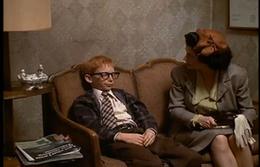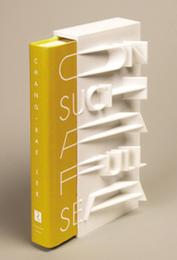Dear FutureMe,
My own universe-is-expanding-what's-the-point moment of doubt arrives annually while reading dispatches from the Consumer Electronics Show. This year, just as I'd finally come to terms with the weirdly commonplace nature of e-books floating in the virtual ether and POD titles instantly available in certain indie bookshops, I learned that I now must gear up for the oncoming ubiquity of a "3D printing trend" that "bodes a future in which shoes, eyeglass frames toys and more are printed at home as easily as documents," as AFP described it.
At CES, musician will.i.am, speaking as "creative officer for 3D Systems," predicted that within a decade, "3D printers will be in your house like refrigerators, TVs and microwaves."
Is that true, FutureMe?  And just when I was thinking print books might be a refuge for now from this one aspect of digital nation's manifest destiny, I read in Time about the intriguing limited edition of Chang-rae Lee's new novel On Such a Full Sea, which "brings publishing into the future (or, rather, one possible future)" with a 3D-printed slipcover that "features the letters of the title rising off the surface at an angle." Time called the innovation "one direction in which the publishing industry could move, at a time when the future of the physical book remains in question: providing fewer readers who are willing to pay more for each purchase with a reason to splurge for the physical object rather than the digital version, turning books into luxury objects."
And just when I was thinking print books might be a refuge for now from this one aspect of digital nation's manifest destiny, I read in Time about the intriguing limited edition of Chang-rae Lee's new novel On Such a Full Sea, which "brings publishing into the future (or, rather, one possible future)" with a 3D-printed slipcover that "features the letters of the title rising off the surface at an angle." Time called the innovation "one direction in which the publishing industry could move, at a time when the future of the physical book remains in question: providing fewer readers who are willing to pay more for each purchase with a reason to splurge for the physical object rather than the digital version, turning books into luxury objects."
Five years ago, Brooklyn-based MakerBot was the only 3D printer company at CES. "Now, it is surrounded by rivals on a large section of show floor devoted to the trend," according to AFP. Company spokesperson Jenifer Howard said, "We feel like this is the year of 3D printing." Was it, FutureMe?
MakerBot plans to market a 3-D Replicator Mini printer this spring for $1,375. "We believe that the MakerBot 3D Ecosystem we are presenting to the world fulfills the vision of a 3D printer for everyone," said company CEO Bre Pettis. "We have laid the groundwork for everyone to be able to be a creative explorer."
Why am I worrying then? I happen to be really good at adapting. POD and e-books already seem so turn-of-the-century to me. And if we really want to get all big-picture about this, as the BBC did recently with its "Timeline for the Far Future," in a thousand years most of our words will be extinct and in a hundred quintillion years the earth will die. Young Alvy Singer didn't know the half of it.
Do you have a 3D printer, FutureMe? Are you printing out life-size characters and scenes to re-create novels in your house and backyard? What do you do with your 3D Huckleberry Finn and Tom Sawyer after you've "read" them? Are they recyclable?
Whatever mind-boggling predictions you're dealing with in your time, FutureMe, please take solace in knowing that some of them will happen (like Arthur C. Clarke's 1974 spot-on explanation of life with a desktop computer), but not all (still waiting for those affordable flying cars). The trick is, as ever, to make our peace with The Machine without getting crushed in its gears or motherboards--or whatever the hell is being invented now to crush you/me later.
Here, at the dawn of 2014, CES and 3D printers notwithstanding, I'm trying to worry less and be more optimistic. Why? Many reasons. Consider Greenlight Bookstore, Community Book Store, WORD, powerHouse Arena, BookCourt, Spoonbill & Sugartown Booksellers.... It turns out that Little Alvy Singer's mother was wrong. Brooklyn is expanding, which gives me hope for the future of indie booksellers everywhere.
Thanks for listening, FutureMe. Write when you can. I'd love to hear from you.
P.S.: How did those Amazon Prime Air delivery drones work out? --Robert Gray, contributing editor

